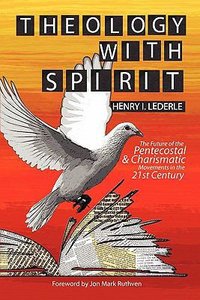Henry I. Lederle: The Third Wave: New Independent Charismatic Churches, Part 2

Editor’s Note: In part two of this excerpt from Theology with Spirit, Dr. Lederle continues his examination of the major streams of the Third Wave, what he has renamed New Independent Charismatic Churches. The Pneuma Review editorial committee hopes you will be encouraged as you read this chapter and will purchase this excellent book for yourself.
Dominion (Postmillennial)
The second major group of Independent Charismatics is also characterized by its view of the kingdom of God. The distinctive teaching is known as Dominion theology and has been described by its pre-millennialist detractors as “Kingdom Now.” The recently deceased Earl Paulk, perhaps the most significant representative of this new thrust, became the Archbishop of the International Communion of Charismatic Churches, a global network representing at its zenith some 10 million members. The ICCC, however, may not be totally identified with Dominion theology. The ICCC was formed in 1982 by Bishop John Meares of Washington, DC, and Bishop McAlister of Rio de Janeiro, Brazil. Later, Bishop Idahosa of Benin City, Nigeria, and Bishop Paulk of Chapel Hill Harvester Church in Atlanta, Georgia, joined. They were all part of a global Pentecostal denomination named the International Evangelical Church, which, interestingly enough, joined the Geneva-based World Council of Churches in 1972 and was the first Pentecostal denomination to participate officially in the Roman Catholic-Pentecostal dialogue.
The origins of Dominion theology, however, do not lie within the Pentecostal-Charismatic arena but outside it in classically Reformed theology. (This is illustrated in the ICCC Handbook, which lists the Presbyterian Westminster Confession in its creedal statements that provide the proper interpretation of the Bible.) Dominion theology is the product of the Christian reconstructionist movement, which developed in the 1960s and ’70s around the publications of scholar Rousas John Rushdoony. In order to understand their influence on the Dominion movement some reconstructionist views will be now outlined briefly. Rushdoony, an Armenian American, established the Chalcedon Foundation in Vallecito, California, in 1965. Another center is the Institute for Christian Economics in Tyler, Texas, founded by Gary North, who has also published widely. Central to the reconstructionist vision is the acknowledgement of the all-embracing cosmic headship of Christ, who has dominion over every dimension of reality, and the ensuing ideal of transforming society in accordance with God’s divine laws. Rushdoony had studied presuppositional apologetics with Cornelius van Til, who taught for many years at Westminster Theological Seminary. It is widely believed that in his book Theonomy in Christian Ethics, Christian reconstructionist theologian Greg Bahnsen argues that the laws of Moses should be applied directly to contemporary public life. The vision is, first, to reclaim the United States as a Christian nation and then to work in a gradual postmillennial strategy to establish the kingdom rule of God over all the earth. This would, in fact, be theocratic rule, with obvious parallels to Puritan thinking. The moral decline in the Western world is seen as the direct result of forsaking the eternal laws of God.
This vision is radical and goes far beyond a mainstream Reformed understanding of the transformation of culture under the Lordship of Christ. Christian reconstructionists hold to a theonomy (law of God) which considers Old Testament laws to be normative for all times. That would entail such extremes as capital punishment for adultery, bestiality, homosexuality, and even for incorrigible children! Critics of this movement go so far as to allege that some reconstructionists condone slavery, and exhibit racist tendencies.
Category: Church History, Pneuma Review, Spring 2012


